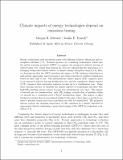Climate impacts of energy technologies depend on emissions timing
Author(s)
Edwards, Morgan Rae; Trancik, Jessika E.
DownloadMain article (3.342Mb)
PUBLISHER_POLICY
Publisher Policy
Article is made available in accordance with the publisher's policy and may be subject to US copyright law. Please refer to the publisher's site for terms of use.
Terms of use
Metadata
Show full item recordAbstract
Energy technologies emit greenhouse gases with differing radiative efficiencies and atmospheric lifetimes. Standard practice for evaluating technologies, which uses the global warming potential (GWP) to compare the integrated radiative forcing of emitted gases over a fixed time horizon, does not acknowledge the importance of a changing background climate relative to climate change mitigation targets. Here we demonstrate that the GWP misvalues the impact of CH[subscript 4]-emitting technologies as mid-century approaches, and we propose a new class of metrics to evaluate technologies based on their time of use. The instantaneous climate impact (ICI) compares gases in an expected radiative forcing stabilization year, and the cumulative climate impact (CCI) compares their time-integrated radiative forcing up to a stabilization year. Using these dynamic metrics, we quantify the climate impacts of technologies and show that high-CH[subscript 4]-emitting energy sources become less advantageous over time. The impact of natural gas for transportation, with CH[subscript 4] leakage, exceeds that of gasoline within 1–2 decades for a commonly cited 3 W m[superscript −2] stabilization target. The impact of algae biodiesel overtakes that of corn ethanol within 2–3 decades, where algae co-products are used to produce biogas and corn co-products are used for animal feed. The proposed metrics capture the changing importance of CH[subscript 4] emissions as a climate threshold is approached, thereby addressing a major shortcoming of the GWP for technology evaluation.
Date issued
2014-04Department
Massachusetts Institute of Technology. Engineering Systems DivisionJournal
Nature Climate Change
Publisher
Nature Publishing Group
Citation
Edwards, Morgan R., and Jessika E. Trancik. “Climate Impacts of Energy Technologies Depend on Emissions Timing.” Nature Climate Change 4, no. 5 (April 25, 2014): 347–352.
Version: Author's final manuscript
ISSN
1758-678X
1758-6798